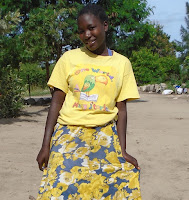This Spring we would like to introduce our supporters to some of the incredibly hard-working individuals who help run our operations in Tanzania. We will begin with our Dean of Students, Mr. Samo Matiko. Our COO, Seth Diemond, interviewed Mr. Samo and asked him questions about himself and his job and responsibilities at JBFC.
Name: Samo Matiko
Age: 36
Hometown: Tarime
Position: Dean of Students, Office of Student
Development
Samo Matiko, JBFC’s Dean of Students, has been with JBFC for
five years and has two children- one of whom, Miriam, studies at Joseph and
Mary. Samo has served as a classroom teacher, Head of Primary, and is currently leading
the Office of Student Development. He is a vital part of JBFC’s mission to
alleviate extreme rural poverty in East Africa.
Over the years, he has helped shape the lives of hundreds of children at JBFC and in our village of Kitongo, as a teacher to our students, a role model to our children, and a friend and mentor to JBFC’s residential girls. The work that JBFC, and more specifically Joseph and Mary School, does in molding the future leaders of Tanzania wouldn’t be possible without Samo’s assistance.
Over the years, he has helped shape the lives of hundreds of children at JBFC and in our village of Kitongo, as a teacher to our students, a role model to our children, and a friend and mentor to JBFC’s residential girls. The work that JBFC, and more specifically Joseph and Mary School, does in molding the future leaders of Tanzania wouldn’t be possible without Samo’s assistance.
Seth Diemond, JBFC COO-TZ: What do you do as Dean of Students and Head of the Office of Student Development?
SM: Generally student development. I am trying to help students,
who are struggling. I am also trying to help them choose their careers and above all
counseling them on how to be good citizens.
SD: What do you like about JBFC?
SM: The working environment. The leaders and those who are
being led are friendly. For instance, if there is any emergency, they come
together and help each other. Or if there is a big problem, they come together
and try to find a way out. Unlike other areas, when a problem comes up, people
just struggle on their own.
SD: How is JBFC different?
SM: We offer quality education at school fees which are
lower than normal. Also, at Joseph and Mary School, we don’t use corporal punishment.
At Joseph and Mary School, we stay with students for a longer time than most
schools, from 8:00AM to 4:00PM. We have different programs that
are not found in other schools: IEP (individual education plans), guidance and counseling, Planned
Parenthood. We have a library; we have Kobos; and we have Family Literacy. We also have
a modern laboratory whereby Joseph and Mary students can start using [the facility] in primary school,
unlike in other schools where they have to wait until secondary school. For our students, that
means to acquire knowledge that can help them fit anywhere in their life.
SD: What is your favorite part of your job?
SM: Guiding and counseling, because it helps young people. It
is this way. When I counsel a student who has a problem and I see the problem
has gone/they take my advice, I really feel good because I know I have met
someone who will be a good person in the future.
The Family Literacy also because it helps parents be part of educating the students, unlike other places where they leave everything to the teachers. If the parents come and they feel part of the people who are to educate their kids, the kids feel better to know their parents are fully supporting them.
The Family Literacy also because it helps parents be part of educating the students, unlike other places where they leave everything to the teachers. If the parents come and they feel part of the people who are to educate their kids, the kids feel better to know their parents are fully supporting them.
SD: What is your connection to the JBFC residential girls?
SM: The girls are part of the students at the school and also as a teacher I just support them the way I support others. It is very very important because in Africa, or Tanzania, girls have been left behind. So, if at Joseph and Mary School/JBFC, by having a home like this one, we are trying to bring them up to a level like the boys are. I feel like I am a parent to them because I counsel them and sometimes they come to me to ask some things they want to know.
SD: What else do you like about JBFC's Joseph & Mary School?
SM: Scholarship program- this is a very, very good program.
If possible, we need to expand this. We have students who are very bright from
very poor families that we can even support them more- even other schools. It
is a good program because it tries to focus on the aim of the organization to
reduce/remove poverty through education. [Editor's Note: If you're interested in sponsoring a scholar, please email adoty@jbfc-online.org]
JBFC's Permaculture program is good because it helps our students get food, helps the organization to minimize costs, and apart from that it trains some of our students who will be good farmers in the future.
JBFC's Permaculture program is good because it helps our students get food, helps the organization to minimize costs, and apart from that it trains some of our students who will be good farmers in the future.
































